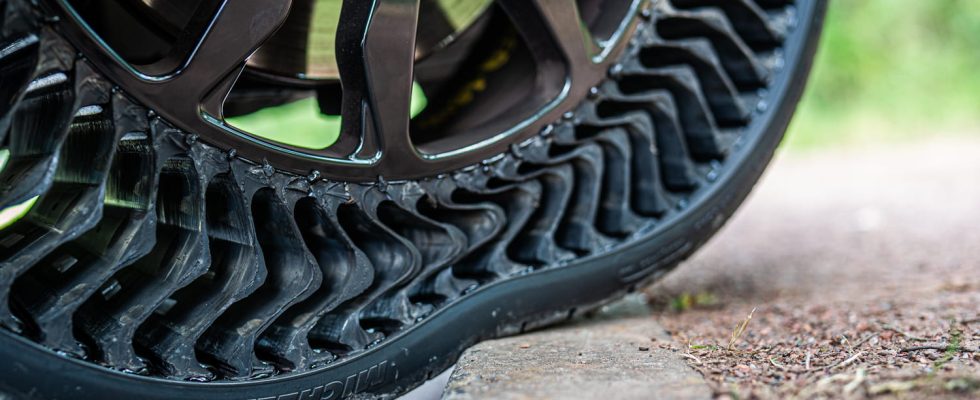Imagine never running the risk of getting a car flat tire again. This is the promise of this new tire recently tested on the roads of France.
Invented in 1887 by a Scottish veterinarian named John Boyd Dunlop – who later created the Dunlop tire company -, the inner tube has proven itself on all types of vehicles. The fact remains that a bad encounter on the road, with a nail or a sharp piece of glass for example, and your tire, failing to fly apart, will end up flat. This incident is generally followed by a trip to the garage synonymous with an expense of several hundred euros.
This risk of arriving late for work or for an appointment or of having to drive several kilometers on the rim – which should be avoided as much as possible in order not to damage your wheel – could soon no longer be a risk. For years, leading tire manufacturers, such as Goodyear, Michelin or Bridgestone, have been working on a new process: the airless tire.
Already tested at the beginning of the century on low-speed machines, on large mowers for example, these revolutionary tires have just landed on French roads! At the end of June, near Douai (North), La Poste proudly presented its first three yellow vans mounted on airless tires. In Hauts-de-France, no less than 40 utility vehicles will experiment for two years with these “Uptis” tires from the Michelin brand, manufactured in South Carolina in one of the Clermont company’s relocated factories.
Towards a replacement of conventional tires in 2030?
At first glance, these new tyres, which for the moment are one with the rim, seem normal. The difference with those inflated with air is in fact between the aluminum wheel and the tread of the tire, this layer of thick rubber directly in contact with the road. This is where small black fins have been slipped in – 64 in total – made from a mixture of fiberglass and resin filaments.
They are the ones that will play the role of the air pressure of a conventional tyre, both in terms of impact resistance, braking performance and driving comfort. It’s no coincidence that these prototypes were initially fitted to Swiss Post utilities, Michelin wishes test your tires first on short trips in town at fairly low speeds.
But the ambition of the manufacturers of these new kinds of tires obviously goes beyond equipping slow-moving vehicles. Other customers are already interested in testing them. And if they are then approved, Michelin will have to produce its “Uptis” on a large scale. Like its competitors, the French manufacturer, established in 18 countries, plans to market its airless tires in 2030. That is to say tomorrow! Until then, try not to die…
